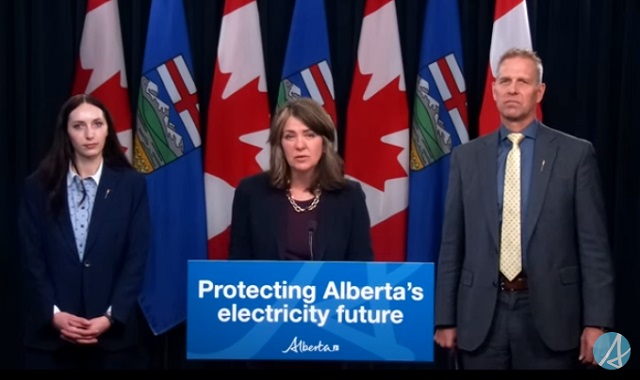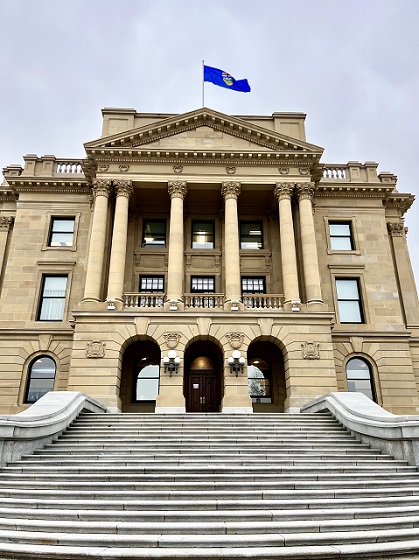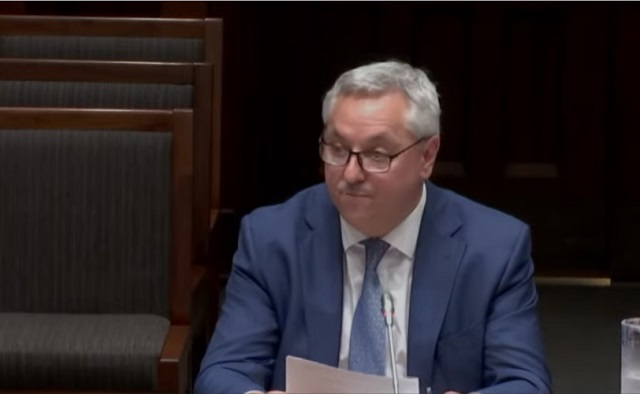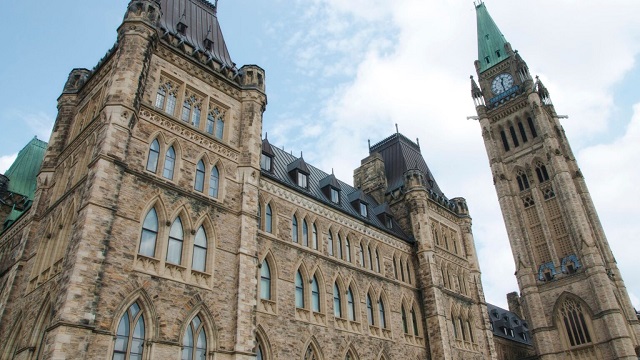Government of Alberta
30th LEGISLATURE- SPEAKER ELECTION AND SPEECH FROM THE THRONE

May 15, 2019
Members of the Legislative Assembly of Alberta will meet on Tuesday, May 21, 2019, at 1:30 p.m. to elect the presiding officers for Alberta’s 30th Legislative Assembly.
Presiding officers include the Speaker, Deputy Speaker and Chair of Committees and Deputy Chair of Committees. All elections are conducted by secret ballot in the Chamber.
The First Session of the 30th Legislature will open at 3 p.m. on May 22, 2019, with the Speech from the Throne by Her Honour the Honourable Lois E. Mitchell, CM, AOE, LLD, Lieutenant Governor of Alberta. The ceremony begins with a 15-gun salute on the South Legislature Grounds, followed by an inspection of a quarter guard in the Legislature rotunda. The event will also feature performances by soprano Cara Lianne McLeod and the Royal Canadian Artillery Band.
Media MUST register via e-mail for each event separately to [email protected] before Friday, May 17 at noon. Upon registration media will receive a confirmation e-mail with details regarding the collection of press passes. While in the Chamber media must wear business attire. Media wearing jeans or sneakers will not be permitted entry. Space is limited in the Chamber, so media will be given access on a first-come, first-served basis and must be in place 15 minutes prior to the ceremony. Video and still photography are allowed, but flash photography is prohibited.
The Chamber ceremonies will be broadcast on Assembly Online at assembly.ab.ca and on Alberta Assembly TV on Telus channel 843, Shaw Cable channel 930 and Shaw BlueSky channel 263 to give access to all Albertans. Photos of the ceremony will be available on Flickr (legassemblyofab) and the video will be posted on YouTube (AlbertaLegislature).
Alberta
Province to stop municipalities overcharging on utility bills

Making utility bills more affordableAlberta’s government is taking action to protect Alberta’s ratepayers by introducing legislation to lower and stabilize local access fees. Affordability is a top priority for Alberta’s government, with the cost of utilities being a large focus. By introducing legislation to help reduce the cost of utility bills, the government is continuing to follow through on its commitment to make life more affordable for Albertans. This is in addition to the new short-term measures to prevent spikes in electricity prices and will help ensure long-term affordability for Albertans’ basic household expenses.
Local access fees are functioning as a regressive municipal tax that consumers pay on their utility bills. It is unacceptable for municipalities to be raking in hundreds of millions in surplus revenue off the backs of Alberta’s ratepayers and cause their utility bills to be unpredictable costs by tying their fees to a variable rate. Calgarians paid $240 in local access fees on average in 2023, compared to the $75 on average in Edmonton, thanks to Calgary’s formula relying on a variable rate. This led to $186 million more in fees being collected by the City of Calgary than expected.
To protect Alberta’s ratepayers, the Government of Alberta is introducing the Utilities Affordability Statutes Amendment Act, 2024. If passed, this legislation would promote long-term affordability and predictability for utility bills by prohibiting the use of variable rates when calculating municipalities’ local access fees. Variable rates are highly volatile, which results in wildly fluctuating electricity bills. When municipalities use this rate to calculate their local access fees, it results in higher bills for Albertans and less certainty in families’ budgets. These proposed changes would standardize how municipal fees are calculated across the province, and align with most municipalities’ current formulas.
If passed, the Utilities Affordability Statutes Amendment Act, 2024 would prevent municipalities from attempting to take advantage of Alberta’s ratepayers in the future. It would amend sections of the Electric Utilities Act and Gas Utilities Act to ensure that the Alberta Utilities Commission has stronger regulatory oversight on how these municipal fees are calculated and applied, ensuring Alberta ratepayer’s best interests are protected.
If passed, this legislation would also amend sections of the Alberta Utilities Commission Act, the Electric Utilities Act, Government Organizations Act and the Regulated Rate Option Stability Act to replace the terms “Regulated Rate Option”, “RRO”, and “Regulated Rate Provider” with “Rate of Last Resort” and “Rate of Last Resort Provider” as applicable. Quick facts
Related information |
Alberta
Alberta taking back control of federal agreements

Alberta has introduced legislation requiring provincial entities to obtain approval before entering, amending, extending or renewing agreements with the federal government.
The introduction of the Provincial Priorities Act, 2024 will support Alberta’s government in pushing back against the federal government’s ongoing overreach into areas of provincial jurisdiction. Alberta’s government will ensure federal funding is aligned with provincial priorities, rather than with priorities contrary to the province’s interests. Under the legislation, agreements between the federal government and provincial entities, including municipalities, that have not received provincial approval would be invalid.
As an example, the federal government’s unrelenting and ideological push toward electric buses in Canadian cities including Calgary does not acknowledge mounting evidence of significant problems with their effectiveness during harsh Alberta winters. Alberta’s government believes the funds that Ottawa allocated for unreliable and impractical electric buses would have been better spent on Alberta priorities including strengthening the province’s economic corridors with improved roads and commuter rail, or advancing the province’s hydrogen strategy as an alternate clean-energy source for transportation.
If passed, the legislation would also support Alberta’s government in getting its fair share of funding when it comes to roads, infrastructure, housing and other priorities. Nowhere is this more apparent than in housing. In summer 2023, Alberta received only 2.5 per cent of the total $1.5 billion in federal housing funds, despite having 12 per cent of the country’s population and, by far, the fastest population growth.
The legislation would also work to prevent taxpayer dollars being wasted on duplicative programs like pharmacare and dental care when what the province really needs is envelope funding to expand existing provincial programs in these areas.
“It is not unreasonable for Alberta to demand fairness from Ottawa. They have shown time and again that they will put ideology before practicality, which hurts Alberta families and our economy. We are not going to apologize for continuing to stand up for Albertans so we get the best deal possible. Since Ottawa refuses to acknowledge the negative impacts of its overreach, even after losing battles at the Federal and Supreme Courts, we are putting in additional measures to protect our provincial jurisdiction to ensure our province receives our fair share of federal tax dollars and that those dollars are spent on the priorities of Albertans.”
Currently, the Government Organization Act requires intergovernmental agreements to be approved by the Minister of Intergovernmental Relations for Alberta government departments and some public agencies, such as Alberta Gaming, Liquor and Cannabis; Alberta Securities Commission; and Travel Alberta.
However, this requirement does not extend to all Alberta public agencies or broader public sector organizations including municipalities, public post-secondary institutions, school boards and health entities, which has created gaps that could result in federal agreements contradicting provincial priorities and investments. By introducing the Provincial Priorities Act, Alberta’s government is working to close those gaps.
Under the proposed legislation, provincial entities include Alberta public agencies and Crown-controlled organizations, as well as public post-secondary institutions, school boards, regional health authorities, Covenant Health, municipal authorities and housing management bodies.
“For years, the federal government has been imposing its agenda on Alberta taxpayers through direct funding agreements with cities and other provincial organizations. Not only does Alberta not receive its per capita share of federal taxpayer dollars, the money we do receive is often directed towards initiatives that don’t align with Albertan’s priorities. Albertans from all corners of the province expect our federal share of taxes for roads, infrastructure, housing and other priorities – not federal government political pet projects and programs in select communities.”
Currently, Quebec is the only other province or territory with similar legislation that requires provincial approval of intergovernmental agreements between a broad scope of public sector organizations and the federal government. During a federal-provincial-territorial meeting in November 2023, Premiers from across the country demanded that the federal government work with them, not around them when it came to agreements with municipalities. Additionally, the Premiers committed to exploring the need for provincial authorization on federal agreements.
Related information
-

 Brownstone Institute2 days ago
Brownstone Institute2 days agoDeborah Birx Gets Her Close-Up
-

 Alberta2 days ago
Alberta2 days agoCoutts Three verdict: A warning to protestors who act as liaison with police
-

 Alberta2 days ago
Alberta2 days agoAlberta moves to protect Edmonton park from Trudeau government’s ‘diversity’ plan
-

 Energy2 days ago
Energy2 days agoCanada Has All the Elements to be a Winner in Global Energy — Now Let’s Do It
-

 Business2 days ago
Business2 days agoMaxime Bernier warns Canadians of Trudeau’s plan to implement WEF global tax regime
-

 espionage2 days ago
espionage2 days agoCanada’s intelligence chief says he personally warned Trudeau about China’s election meddling
-

 Freedom Convoy2 days ago
Freedom Convoy2 days agoOttawa spent “excessive” $2.2 million fighting Emergencies Act challenge
-

 Brownstone Institute2 days ago
Brownstone Institute2 days agoA Coup Without Firing a Shot





